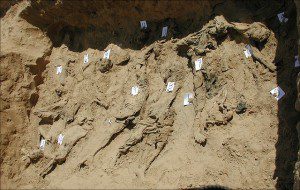In his first year in office, President Barack Obama pledged to “collect the facts” on the death of hundreds, possibly thousands, of Taliban prisoners of war at the hands of U.S.-allied Afghan forces in late 2001.
Almost four years later, there’s no sign of progress.
When asked by ProPublica about the state of the investigation, the White House says it is still “looking into” the apparent massacre. Yet no facts have been released and it’s far from clear what, if any, facts have been collected.
Human rights researchers who originally uncovered the case say they’ve seen no evidence of an active investigation.
The deaths happened as Taliban forces were collapsing in the wake of the American invasion of Afghanistan. Thousands of Taliban prisoners had surrendered to the forces of a U.S.-supported warlord named Abdul Rashid Dostum. The prisoners, say survivors and other witnesses, were stuffed into shipping containers without food or water. Many died of suffocation. Others were allegedly killed when Dostum’s men shot at the containers.
A few months later, a mass grave was found nearby in Dasht-i-Leili, a desert region of northern Afghanistan.
The New York Times reported in 2009 that the Bush administration, sensitive to criticism of a U.S. ally, had discouraged investigations into the incident. In response, Obama told CNN that “if it appears that our conduct in some way supported violations of the laws of war, I think that we have to know about that.”
A White House spokeswoman told ProPublica that there has indeed been some kind of review – and that it’s still ongoing: “At the direction of the President, his national security team is continuing its work looking into the Dasht-i-Leili massacre.” She declined to provide more details.
“This seems quite half-hearted and cynical,” said Susannah Sirkin, director of international policy at Physicians for Human Rights, the group that discovered the grave site in 2002 and since then has pushed for an investigation.
The group sent a letter to the president in December 2011, the tenth anniversary of the incident. In a follow-up meeting some months later, senior State Department officials told Physicians for Human Rights that there was nothing new to share.
“This has been a hot potato that no one wanted to deal with, and now it’s gone cold,” said Norah Niland, former director of human rights for the United Nations in Afghanistan.
Human rights advocates have long said the responsibility for a comprehensive investigation lies with the U.S., because American forces were allied with Dostum and his men at the time. Surviving prisoners have also claimed that Americans were present when the containers were loaded, though that’s never been corroborated.
A Pentagon spokesman told ProPublica that the Department of Defense “found no evidence of U.S. service member participation, knowledge, or presence. A broader review of the facts is beyond D.O.D.’s purview.” That initial review has never been made public.
At this point, say advocates, an investigation should address not just the question of U.S. involvement, but also what the U.S. did in the years that followed to foster accountability.
“I’m not saying Dostum ordered these people killed, and I’m not saying U.S. troops participated,” said Stefan Schmitt, a forensic specialist with Physicians for Human Rights. “All I’m saying is there are hundreds if not thousands of people that went missing. In a country that’s looking to have peace, to be under the rule of law, you need to answer these questions.”
Initially excited by Obama’s statement, researchers with Physicians for Human Rights peppered the administration with their findings. But the response was “murky at best,” said Sirkin.
“We were never very clear on who within the administration was delegated the task,” she said. Current and former administration officials interviewed by ProPublica couldn’t say which agency or department had the job.
Sirkin and others eventually resigned themselves to the fact that Obama, in his televised remarks, had not specifically called for a full investigation. With the U.S. now withdrawing from Afghanistan, many observers say it’s no surprise that investigating Dasht-i-Leili is no longer a priority.
Dostum still holds considerable sway in Northern Afghanistan, though he has fallen in and out of favor with the U.S. and with Afghan president Hamid Karzai. The Times recently reported Dostum is one of several former warlords to whom Karzai passes on thousands of dollars in cash he receives from the CIA each month. (We were unable to reach Dostum himself for this story.)
The Obama administration has been cool toward him in recent years, saying ahead of Afghanistan’s elections in 2009 that the U.S. “maintains concerns about any leadership role for Mr. Dostum in today’s Afghanistan.”
Read more here on the inaction on investigating the Dasht-i-Leili massacre.



